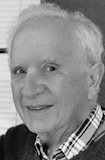 In Memoriam
In Memoriam
Reuben Pannor
Pannor (and his twin brother, Harry) were born on July 4, 1922, in the small Lithuanian village of Slobodka. When Pannor was eight years old, in response to the growing antisemitism in Europe, the Pannors emigrated to America, where his parents worked as tailors in a factory.
Pannor served in the Army Air Corps during World War II, after which he attended Cornell University, in Ithaca, NY, where he earned an undergraduate degree, and Columbia University, where he earned a Master’s in Social Work. Pannor married Puoghkepsie native Sydell Alpers, whom he met at the Museum of Modern Art.
Pannor and his wife followed his twin brother, Harry, to Los Angeles, eventually settling in Pacific Palisades. Pannor worked at the nationally recognized child welfare agency, Vista del Mar of Los Angeles, where he served as Director of Community Services and, later, as Director of Adoptions.
Pannor’s first book, The Unmarried Father (1971), co-written with Byron Evans, was the result of his observations that the needs of birth fathers were being overlooked.
Pannor further developed his key principles regarding the rights of all parties within the so-called adoption triangle through his professional interactions with birth parents, adoptive parents and adoptees, by which he noted that birth parents often suffered for years as a consequence of their loss; that it was natural for children to wonder about their biological origins; and that adoptive parents’ relationships with their children were not necessarily harmed by openness about adoption.
Pannor championed the belief that knowledge of one’s origins should be a civil right for all, and, in 1978, co-wrote the seminal book, The Adoption Triangle, with Annette Baran (who died on July 11, 2010, at the age of 83) and Arthur Sorosky, in which the authors put forth the argument that adopted children had a right to know about their origins and that closed-records laws should be repealed.
In another book co-written with Baran, Lethal Secrets (1988), Pannor addressed the issues of secrecy and genetic heritage for children conceived by anonymous donor insemination.
Excerpted from the April 2013 edition of the Operation Identity Newsletter
© 2013 Operation Identity